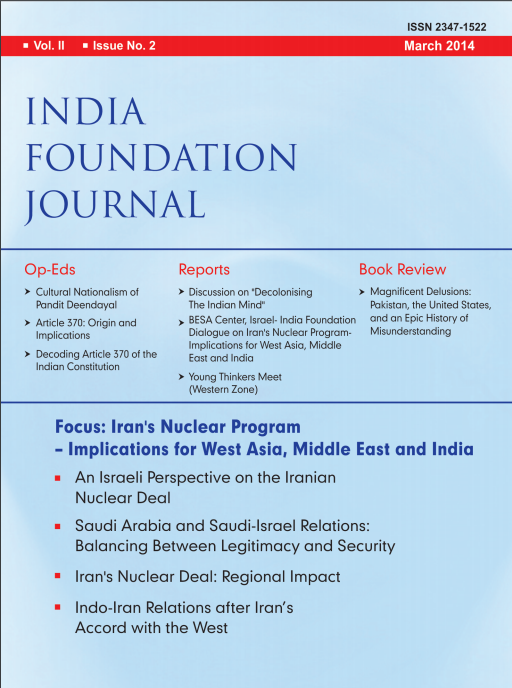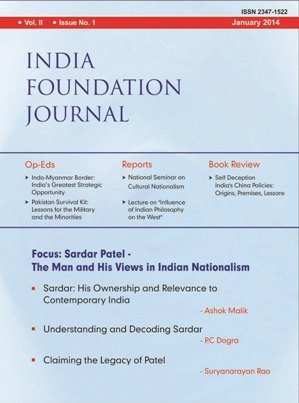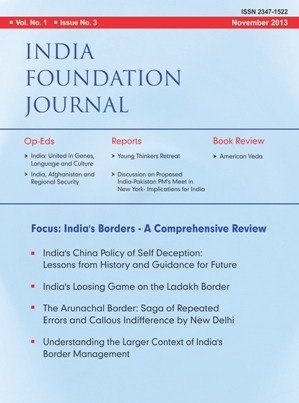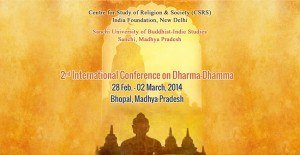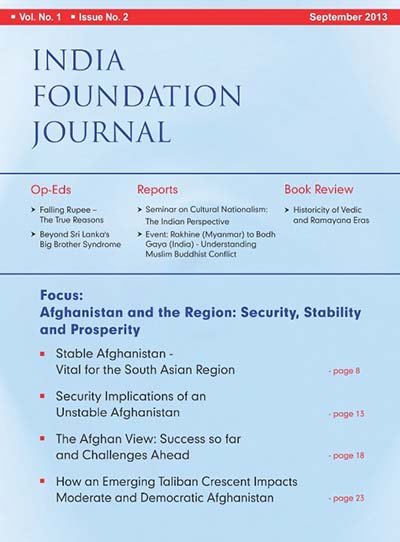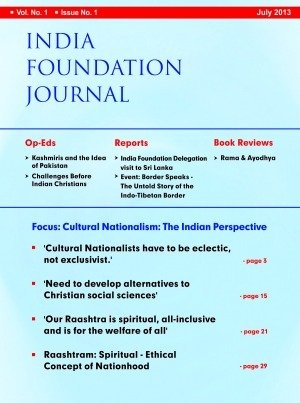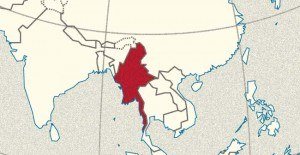The discussion on the Muslim Buddhist conflict was organized by India Foundation on 18th July, 2013 to provide a platform where eminent speakers shared and put forth their concerns regarding the recent events in Myanmar and Bodh-Gaya and their impact on India in particular and the world in general.
The speakers at the event were Dr. Tint Swe, Former MP (NLD), Burma Center Delhi (BCD) and Shri Bhaskar Mitra, IFS (Retd.), Former Ambassador to Myanmar. Dr. Chandan Mitra, MP (Rajya Sabha) and Director-India Foundation chaired the event.
Dr. Chandan Mitra started the discussion by pointing out that the situation in Myanmar has spilt over to a large part of the subcontinent. It is a well planned move by Islamist groups to mobilize in the name of Umma and cause turmoil through the Indian subcontinent. He said it is very unfortunate and surprising that considering the close association between India and Burma historically (pointing out that Burma derived its name from Brahmadesh), India and Burma post independence have drifted apart for inexplicable reasons. Burma has gone through a long period of turmoil, particularly due to the military dictatorship Burma drew close to China although some leaders were in this period in contact with India. But the issue of today’s discussion of the conflict between the Islamists and the Burmese people particularly the Buddhists and how this has spread to parts of India (mentioning the rally which took place in Mumbai as a protest against the Rohingya Muslims in Burma and how the morphed pictures were used against the people of North East causing widespread disturbance across the nation). The motive of these activities is to create disturbances in India and thereby expand the role of Islamist groups by bringing them under one radical banner so that it serves their purpose eventually to radicalize Muslim communities
in India.
It is now clear that Lashkar-e-Taiba has been training the Rohingya insurgents to unleash massive anti-Buddhist and anti-Hindu violence in India. This is a problem which India shares with the democratic Myanmar and there is a need to discuss and highlight this issue.
Dr. Tint Swe started by saying that his perspectives were those of a Burmese Buddhist and may be biased. For the serial blasts at Bodh Gaya he tendered an apology to India in particular and the Buddhist community around the world in general. He deeply regretted the death and causalities of non-Buddhist community He felt that it was wise that India was finding out whether Bodh Gaya attacks had any linkage with communal riots in Myanmar.
Dr. Swe pointed that recently there has been a lot of pressure from the international community on Mynamar regarding the Rohingyas. According to him ‘Burmese Muslims’ have been living peacefully for hundreds of years and have had no problems with the Buddhist majority. They constitute about 4% of the Myanmar’s population which is predominantly Buddhist (90%). It was important to differentiate between ‘those who just want to be called Rohingyas’ and ‘those who are militants’ as described in the websites of the extremists. The title, ‘Rohingya’ is extremely popular outside the country while it is not uttered inside Burma. The government’s official stand repeatedly states: this population is officially called ‘Bangali Muslims’. Foreigners including UN are asking to amend the citizenship law of Burma. He said he was ignorant if there any country in the world was asked for such amendment
He pointed out the unprecedented and disproportionate response of international community to the violence in northern Arakan in mid-2012. The situation arose when an Arakanese woman was gang raped and killed by local Muslim men. Unlike the Delhi rape this incident failed to attract world’s attention. His Holiness denounced violence. Other Buddhist population nations across the world were quiet. There were few to take the case of the Buddhist population. On the other hand when the violence of retaliation broke out causing 170 deaths foreign assistance flowed in hundred of millions of dollars particularly from Gulf nations. Compare this to the devastating Cyclone Nargis which hit costal lower Burma on May 2, 2008 in which 130,000 Burmese died. The combined international help was less than USD 50MM.
This he believed was because the Islamic world is well organized, thanks to OIC (57 countries, 5 observers and 7 organizations) and the UN (196 nations). “The Secretary General of the Organization of Islamic Cooperation (OIC), Professor Ekmeleddin Ihsanoglu tasked the Government of Myanmar to assume its responsibility to eradicate all forms of discrimination against Muslims and not allow Buddhist extremists to incite against any section of the community. He noted that this discrimination includes the 2005 law which imposes on all Rohingya Muslim families the policy limiting them to only two children in Buthidaung and Maundaw cities in Arakan State. He described this law a violation of all human rights standards.”
Common Burmese are curious to know what did task mean. It is not a usual diplomatic language such as urge, call for or appeal. He spoke at the Arakan Rohingya Union Congress held in Jeddah from 7 – 8 July 2013. On the same day on July 7, two Buddhist monks were injured in a string of bombings at Bihar’s 1,500-year old Mahabodhi temple in Bodh Gaya in India where the Buddha attained enlightenment.
He pointed that the world community fails to take the entire issue in perspective and the biased reporting often leads to certain wrong perceptions. The pushing factor for communal riots since the last one year in Burma is rooted in migration from outside. Unless this is checked problem will not go away. Also the biased help to a particular community and not to others also fuels greater and wider dissent. He shared the Buddhist perspective on this issue. One Burmese author recently wrote an article which says, “Anger and anxiety in multi-ethnic Myanmar”. The arguments are interesting.
1. Threat perception in Buddhist Communities
2. Name and Shame strategy does not work
3. Assertive leadership required
Dr. Swe sincerely wished India and neighbouring countries escape from collateral damages of this conflict
Shri Bhaskar Mitra said that the reaction of the international community on the issue in Myanmar has been very unfortunate. This he said was because the Burmese government has always failed to put across their own views and failed to put across the situation as they see it in a more persuasive manner. They just let it slide.
Shri Mitra got into the genesis of the problem. The first Muslims who went in Myanmar was in 1430 when the then King Narameikhla restored his kingdom with the help of the Sultanate of Bengal. They were small in number.
The term Rohingya itself doesn’t exist anywhere either as an ethinc group or as any other group and the Government of Myanmar has consistently refused to accept that there is any ethnic group as Rohingya. The first time this word, which was written by a local journalist in a local paper The Guardian, Rangoon where they sought a political identity. Although Muslims had been moving there in small numbers since 1430 it basically increased after the conquest of the Arakan by the British around 1820. The British like all over the world created a major problem here. They wanted the good farming land and increased paddy production so they bought Muslims over from India. Hence unchecked migration took place there. In 20 years, the population had jumped over 300%. This became a problem politically, socially and economically vis-a-vis the local people.
The situation continued right up to 1942 when the Japanese invaded Burma. General Aung San allied with the Japanese initially. British thought that since there was a difference with the Muslim community so they armed the Muslim community in the Arakan asking them to fight the Japanese and promised them a national area of their own. Fortunately for the British and unfortunately for everybody else in Myanmar, the Muslim population used those weapons not against the Japanese but to wipe out the Arakanese Buddhists. 20,000 people are recorded killed. First seeds of real violence were sown at that time.
In 1946, well before the time of independence of Myanmar, when of course a great deal of talk of independence was going on and Mr. Jinnah was speaking loud and far. The Muslim leaders who have gone under various names like Rohingya Patriotic Group, Rohingya Liberation Front etc approached Jinnah and asked for a separate region, adjacent to Bangladesh, to be joined with the then Pakistan. Not much came of it but thereafter continuously illegal immigration continued and demand on part of Muslim population of joining Bangladesh started. In 1952, Myanmar government carried out the Mayu operation and in 1954, they carried out Operation Monsoon. The major centres of the Mujahids were captured and by 1957 they had surrendered. The Mujahids surrendered to Brigadier Aung Gyi once they realized that there was no longer any hope for their rebellion due to negotiations between Burma and Pakistani governments on handling of the rebels on border areas.
From 1962 when General Ne Win took over, who was a very strong administrator, things were very quiet. Then came the 1971 war, where Bangladesh fought for independence and naturally there was lot of flow of arms in the region. At the end of that, many of the Muslim groups of Arakan got hold of substantial number of arms. They started this party called the Rohingya Liberation Party which was a very aggressive party and it started operation against the Burmese Army in 1974. This in one form or the other continued. In 1978 General Win carried out Operation King Dragon which was a very major operation and large number of persons fled Myanmar. In the early 1980s, more radical elements broke away from the Rohingya Patriotic Front (RPF) and formed the Rohingya Solidarity Organisation (RSO). RSO was based only on religious lines unlike others who also had a political front. In 1991, Myanmar government again carried out a massive operation against Rohingyas and over 250,000 fled. It is interesting to note that at that point of time, Saudi Defence Minister Prince Khaled Sultan Abdul Aziz happened to visit Bangladesh and it is there on record that he advised the Bangladesh Government to go against Burma like Operation Desert Storm.
This situation continued till Gen Win stepped down in 1988. After democracy waves started and student’s movement, there was a situation of confusion, an uneasy situation in Myanmar so the Rohingyas again went on the offensive. The monks have a very significant hold over the army. In 1988 when the students demonstrated for democracy, the senior most monks lend their support to this movement. When some of the soldiers had orders to shoot down the monks, some of the monks in Mandalay who are most active monks, immediately passed a fatwa against the Generals saying that they will not attend their marriages, funerals and so on. Within hours the Generals were on their knees and apologized to the monks. It is not entirely correct to talk of Muslim-Buddhist conflict as such because unlike the Muslims pushing the religious factor very far the Buddhist monks have till now played a very dormant role. Theravada Buddhism, predominant in Myanmar, is that branch of Buddhism where the monks do take very active part in politics as we have seen in Vietnam, Thailand and also in Burma from time to time. However in Myanmar there intervention has been very limited till now. If you take this entire picture into mind it leaves us with no doubt that the Myanmar government is doing very best under very trying circumstances. How long this patience will last is yet to be seen
Dr. Chandan Mitra thanked the speakers for putting the problem in perspective.
have gone after this entire conflict on the religious basis and they have enormous support from Muslim groups in the country and outside the county. It is not entirely correct to talk of Muslim-Buddhist conflict as such because in addition to Muslims pushing the religious factor very far the Buddhist monks have up till now played a very low role. I really don’t see them out in a militant mood like in the past. Theravada Buddhism is that branch of Buddhism where the monks do take very active part in politics as we have seen in Vietnam, Thailand and also in Burma from time to time but certainly not on this issue. As regards the recent riots in 2012, foreign minister of Bangladesh Deepu Moni, herself said that the Jamat in Bangladesh was actively helping these people. If you take this entire picture into mind it leaves us with no doubt that the Myanmar government is doing very best under very trying circumstances. I would really love to see how the west which is so critical of Myanmar would have dealt with a situation like this if it happened in their own country.
Dr. Chandan Mitra thanked Shri Bhaskar Mitra for putting the problem in perspective.
uuu

 Dr Paranjape said that we should stop blaming the west for what it did and rather get ahead with our own task of researching and writing. We should also praise the western scholars for bringing us out of a defeated mindset. He said that decolonization is a negative term. Swaraj is a better term to describe the mind and perspective that we aim for. Indian nationalism is not for dominating others. It is different than other forms of nationalism. For India, it can be said that ‘In my Swaraj lies your Swaraj’. He also cautioned the audience against misunderstanding or misinterpreting the process of decolonization. If Indian decolonization is chauvinist, it will be great loss to the mankind. He also said that there are various levels at which we need decolonization. It is not just in our history textbooks or education system.
Dr Paranjape said that we should stop blaming the west for what it did and rather get ahead with our own task of researching and writing. We should also praise the western scholars for bringing us out of a defeated mindset. He said that decolonization is a negative term. Swaraj is a better term to describe the mind and perspective that we aim for. Indian nationalism is not for dominating others. It is different than other forms of nationalism. For India, it can be said that ‘In my Swaraj lies your Swaraj’. He also cautioned the audience against misunderstanding or misinterpreting the process of decolonization. If Indian decolonization is chauvinist, it will be great loss to the mankind. He also said that there are various levels at which we need decolonization. It is not just in our history textbooks or education system.


 After the two presentations, the house was declared open and questions were invited from the audiences. The first question was how well is the notion of Swaraj practiced in academics? Has it
After the two presentations, the house was declared open and questions were invited from the audiences. The first question was how well is the notion of Swaraj practiced in academics? Has it





